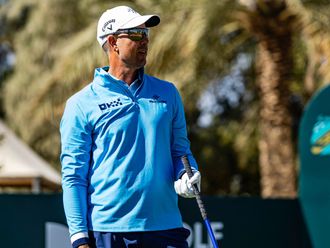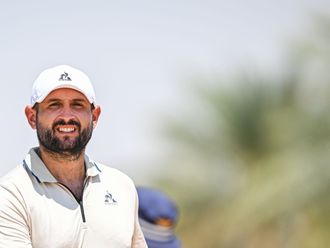Dubai: Chester Williams, the only black player in South Africa’s 1995 Rugby World Cup-winning squad, believes more needs to be done to revive the legacy of that triumph 20 years on.
The Springboks’ 15-12 victory over New Zealand at Ellis Park in Johannesburg came to symbolise the unity of Nelson Mandela’s ‘Rainbow Nation’ one year after he came to power to end apartheid. It was also the country’s return from an international sporting boycott as a result of that era’s racial segregation, and they were under pressure to prove they stood for equality, as documented in the 2009 film Invictus.
As the team’s only black player, Williams, then a 24-year-old wing, was seen as a poster-boy for change, but also demonstrated that he was in the squad on merit when he scored four tries in the quarter-final against Western Samoa.
Two decades on, however, Williams, now 44, views the country’s first World Cup win, and what it stands for, as a distant dream, especially after Mandela left power in 1999 and died in 2013.
“When the final whistle went, some laughed, others cried and people were hugging each other in disbelief,” he told Gulf News. “This was the first time I saw a united Rainbow Nation, but sadly it was only temporary.
Another win needed
“People lost focus after Mandela left and didn’t continue it. Maybe we need another World Cup similar to that in 2023 in South Africa to ensure we have that unity again,” he adds in reference to the country’s bid to be host nation, where they are up against Ireland, Italy and France to succeed England 2015 and Japan 2019 as the tournament’s next host nation.
“It’s not lost,” he says of the 1995 notion. “It’s just a matter of catching up again and continuing the legacy of having all individuals perform as a team. “In all aspects of the country there is still inequality and people still get treated differently. Things improved, but at a slow rate, and 20 years on things haven’t changed greatly. The law changed and the game professionalised, but there still aren’t sufficient opportunities for black people and that’s in all aspects of life, not just rugby.”
South Africa is a country of 54 million people — 80 per cent of whom are black — yet the rugby team is still majority white.
Rugby bosses announced plans this year to select seven non-white players in future 23-man squads, at least two of whom should be black African, as the country looks to achieve 50 per cent black representation in their squads by 2019.
“There are more black players compared to when I was playing, but they still don’t get sufficient playing time,” added Williams, who scored 70 tries in 27 appearances for his country between 1993 and 2000. “If you talk about experienced players, it’s not about having one or two games. Only when they have 20, 30 or 50 games, then you can say things have changed.
Playing on merit
“There are quotas in place and in a way you need that enforced or you won’t have black players, but it’s also negative as it weakens their self worth, but then they need to take that opportunity and prove to people they deserve their place on merit like I did.
“I don’t think we are going beyond the current quotas though, so we still have a long way to go.”
Williams shattered the illusion of 1995 when he revealed he was racially abused by his teammates and left to eat alone at lunch in his 2002 authorised biography Chester. But he says he doesn’t regret speaking out or tarnishing that victory.
“That was in the beginning of my career, but once I had proven my worth things changed. That was just the way they were thinking at the time.
“Playing in teams all my career where I was the only black player in a white-dominated sport was always a challenge. But, despite the fact I was not supposed to play with or against them, I made it against all odds.
“At times I was called a black token player. The spectators didn’t hesitate to call me racist names, asking me what I was doing there. But the more they called me racist names, the more I wanted to prove that I was the best.
“Those guys changed after I started to score tries and make tackles because they realised that I was for real.
“I don’t regret telling my story, as everyone knew the story of Nelson Mandela and the Springboks, but they didn’t know what I had to go through to overcome people’s mindset towards blacks.
Defining moment
“Scoring four tries against Samoa in the quarter-final was a defining moment in the history of South Africa, as it was the most amount of tries scored by a South African in a World Cup match [at the time] and it definitely changed people’s perception toward black players.”
And of Williams’ interaction with Mandela, who was even a guest of honour at his wedding, he said: “Mandela was a politician who understood his people, black and white. He was a people’s person, a visionary and humble. He was the icon of the world.
“Nelson knew what he was doing in not replacing the Springbok emblem,” he added in reference to keeping the symbol synonymous with all-white squads. “He knew that everyone was going to support the Springboks.”








